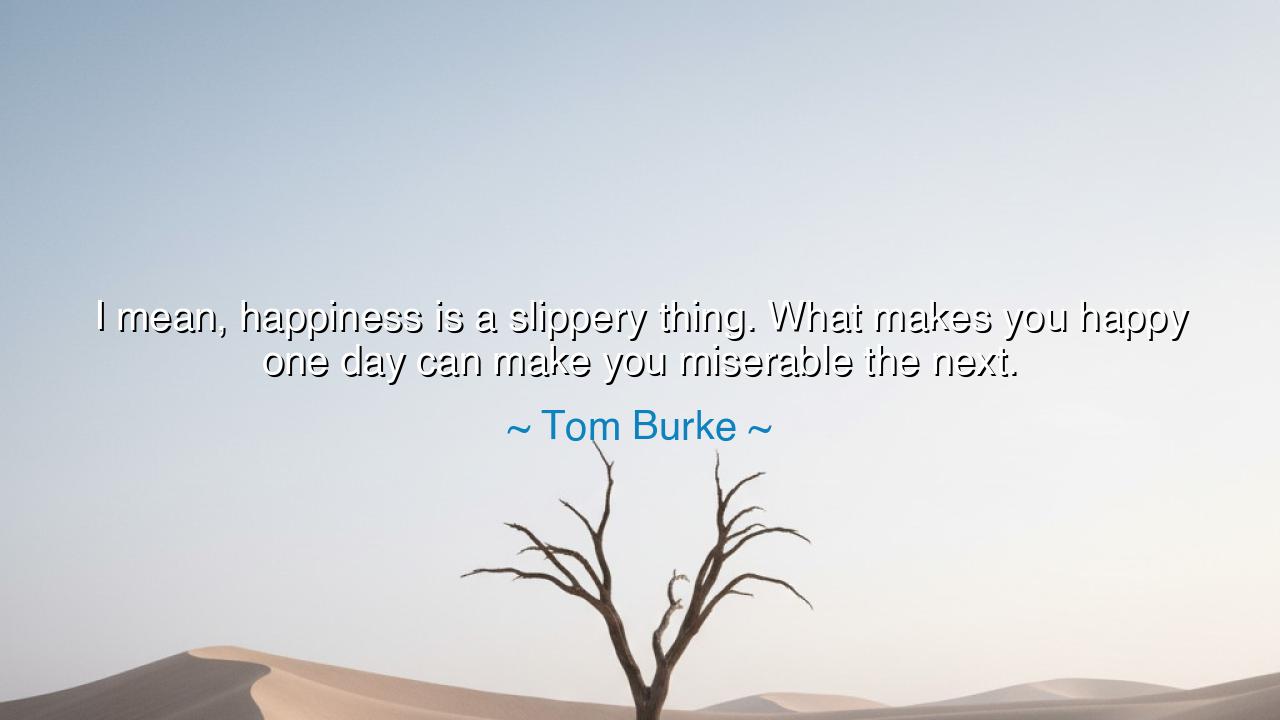
I mean, happiness is a slippery thing. What makes you happy one
I mean, happiness is a slippery thing. What makes you happy one day can make you miserable the next.






In the words of Tom Burke, “I mean, happiness is a slippery thing. What makes you happy one day can make you miserable the next,” there breathes a timeless wisdom — an understanding of the fleeting, ever-shifting nature of human joy. These words, simple in form yet profound in meaning, remind us that happiness is not a possession to be seized, but a current to be felt and released. Burke, known for his depth of thought and honesty, speaks here as one who has watched the tides of contentment rise and fall, who has seen that what once brings delight can, in another hour, bring sorrow. For life, in its mystery, refuses to give us joy without change — and the same things that once uplifted the heart may, with time or circumstance, become the source of its heaviest ache.
The origin of this quote reflects the insight of an artist — one who lives close to the pulse of emotion, and who has learned that joy and pain are woven from the same thread. Tom Burke, as an actor, lives within stories — human stories that reveal the paradox of feeling. His reflection is born not of philosophy alone, but of experience: the understanding that happiness is fragile, dynamic, and deeply dependent on time, place, and the inner state of the heart. What thrills us today may grow hollow tomorrow; what once nourished us may one day feel like a chain. Thus, Burke’s words do not lament the impermanence of happiness — they illuminate its nature, urging us to seek not permanence in pleasure, but wisdom in its passing.
The ancients, too, knew that happiness was a treacherous companion. The philosopher Heraclitus taught that “everything flows,” that nothing in life remains fixed — not rivers, not hearts, not joy. To cling to happiness, then, is to grasp at water: it escapes even as we hold it. The Greeks did not worship happiness as we do, but balance — that sacred harmony between joy and sorrow, fortune and loss. For they understood that to live well was not to chase constant delight, but to walk wisely through its changing forms. Burke’s truth stands upon the same foundation: that to demand that happiness remain is to condemn ourselves to misery, for change is the law of all things.
Consider the story of King Midas, who once prayed that all he touched would turn to gold. At first, he rejoiced — the gleam of wealth filled his heart with rapture. But soon that joy curdled into despair, for his food became metal, his daughter became a statue, and his blessing became a curse. What once made him happy destroyed him. In this tale, the gods remind us of Burke’s truth — that the same source of delight can, when clung to or misunderstood, bring ruin. The joy of one season cannot be carried unchanged into the next; for life, like nature, demands renewal, and when we resist that change, happiness becomes misery.
And yet, Burke’s words are not words of cynicism. He does not say that happiness is impossible, only that it is slippery — that it must be held lightly, with reverence, not grasped with desperation. To live wisely is to recognize joy’s transience and to savor it while it stays. Like the morning dew upon the grass, happiness shines brightest when we behold it without expectation. It is not a state to dwell in forever, but a visitation of grace, reminding us of life’s beauty even amid its uncertainty.
The lesson hidden in these words is both humbling and liberating. Do not build your peace upon the fleeting pleasures of the world — wealth, fame, affection, success — for these are shifting sands. Seek instead the deeper foundations: meaning, gratitude, and acceptance. Learn to find joy not in the permanence of what you love, but in the wonder of its existence, however brief. When happiness departs, do not curse it; bow to it as one bows to the setting sun, knowing it will rise again in another form, at another hour.
Thus, O seeker of truth, let your heart be supple as the reed and not rigid as the oak. Accept that what gladdens you today may sadden you tomorrow, but in that acceptance, find peace. For life, in its endless turning, teaches us that joy and sorrow are not enemies, but companions — two halves of the same sacred whole. As Tom Burke reminds us, happiness will slip through your fingers if you try to hold it too tightly. But if you walk with open hands and a willing heart, it will visit you again and again — not as a possession, but as a gift of life’s eternal rhythm.






AAdministratorAdministrator
Welcome, honored guests. Please leave a comment, we will respond soon